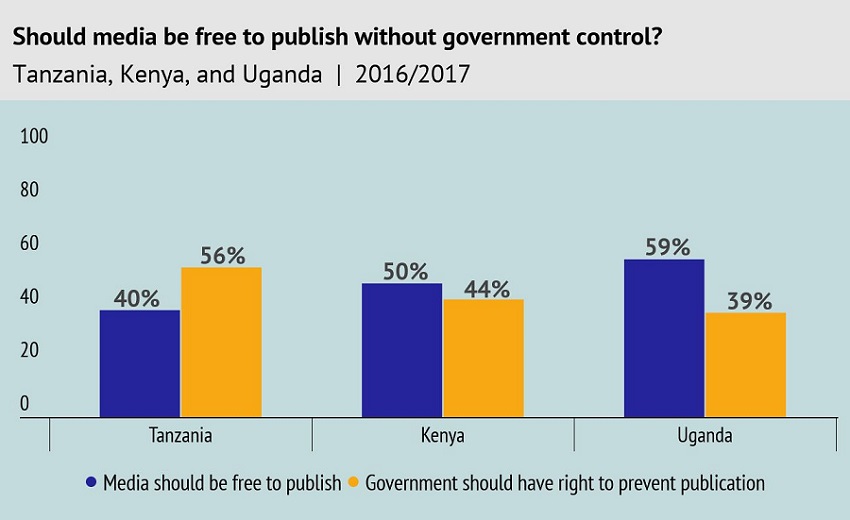WITNESS RADIO MILESTONES
Exclusive: Facebook Opens Up About False News
Published
7 years agoon

NEWS FEED, THE algorithm that powers the core of Facebook, resembles a giant irrigation system for the world’s information. Working properly, it nourishes all the crops that different people like to eat. Sometimes, though, it gets diverted entirely to sugar plantations while the wheat fields and almond trees die. Or it gets polluted because Russian trolls and Macedonian teens toss in LSD tablets and dead raccoons.
For years, the workings of News Feed were rather opaque. The company as a whole was shrouded in secrecy. Little about the algorithms got explained and employees were fired for speaking out of turn to the press. Now Facebook is everywhere. Mark Zuckerberg has been testifying to the European Parliament via livestream, taking hard questionsfrom reporters, and giving tech support to the Senate. Senior executives are tweeting. The company is running ads during the NBA playoffs.
In that spirit, Facebook is today making three important announcements on false news, to which WIRED got an early and exclusive look. In addition, WIRED was able to sit down for a wide-ranging conversation with eight generally press-shy product managers and engineers who work on News Feed to ask detailed questions about the workings of the canals, dams, and rivers that they manage.
The first new announcement: Facebook will soon issue a request for proposals from academics eager to study false news on the platform. Researchers who are accepted will get data and money; the public will get, ideally, elusive answers to how much false news actually exists and how much it matters. The second announcement is the launch of a public education campaign that will utilize the top of Facebook’s homepage, perhaps the most valuable real estate on the internet. Users will be taught what false news is and how they can stop its spread. Facebook knows it is at war, and it wants to teach the populace how to join its side of the fight. The third announcement—and the one the company seems most excited about—is the release of a nearly 12-minute video called “Facing Facts,” a title that suggests both the topic and the repentant tone.
The film, which is embedded at the bottom of this post, stars the product and engineering managers who are combating false news, and was directed by Morgan Neville, who won an Academy Award for 20 Feet from Stardom. That documentary was about backup singers, and this one essentially is too. It’s a rare look at the people who run News Feed: the nerds you’ve never heard of who run perhaps the most powerful algorithm in the world. In Stardom, Neville told the story through close-up interviews and B-roll of his protagonists shaking their hips on stage. This one is told through close-up interviews and B-roll of his protagonists staring pensively at their screens.
In many ways, News Feed is Facebook: It’s an algorithm comprised of thousands of factors that determines whether you see baby pictures, white papers, shitposts, or Russian agitprop. Facebook typically guards information about the way the Army guards Fort Knox. This makes any information about it valuable, which makes the film itself valuable. And right from the start, Neville signals that he’s not going to merely scoop out a bowl of peppermint propaganda. The opening music is slightly ominous, leading into the voice of John Dickerson, of CBS News, intoning about the bogus stories that flourished on the platform during the 2016 election. Critical news headlines blare, and Facebook employees, one carrying a skateboard and one a New Yorkertote, move methodically up the stairs into headquarters.
‘Is there a silver bullet? There isn’t.’
EDUARDO ARIÑO DE LA RUBIA
The message is clear: Facebook knows it screwed up, and it wants us all to know it knows it screwed up. The company is confessing and asking for redemption. “It was a really difficult and painful thing,” intones Adam Mosseri, who ran News Feed until recently, when he moved over to run product at Instagram. “But I think the scrutiny was fundamentally a helpful thing.”
After the apology, the film moves into exposition. The product and engineering teams explain the importance of fighting false news and some of the complexities of that task. Viewers are taken on a tour of Facebook’s offices, where everyone seems to work hard and where there’s a giant mural of Alan Turing made of dominos. At least nine times during the film, different employees scratch their chins.
Oddly, the most clarifying and energizing moments in “Facing Facts” involve whiteboards. There’s a spot three and a half minutes in when Eduardo Ariño de la Rubia, a data science manager for News Feed, draws a grid with X and Y axes. He’s charismatic and friendly, and he explains that posts on Facebook can be broken into four categories, based on the intent of the author and the truthfulness of the content: innocent and false; innocent and true; devious and false; devious and true. It’s the latter category—including examples of cherry-picked statistics—that might be the most vexing.
A few minutes later, Dan Zigmond—author of the book Buddha’s Diet, incidentally—explains the triptych through which troublesome posts are countered: remove, reduce, inform. Terrible things that violate Facebook’s Terms of Service are removed. Clickbait is reduced. If a story appears fishy to fact-checkers, readers are informed. Perhaps they will be shown related stories, or more information on the publisher. It’s like a parent who doesn’t take the cigarettes away but who drops down a booklet on lung cancer and then stops taking them to the drug store. Zigmond’s whiteboard philosophy is also at the core of a Hard Questions blog post Facebook published today.
The central message of the film is that Facebook really does care profoundly about false news. The company was slow to realize the pollution building up in News Feed, but now it is committed to cleaning it up. Not only does Facebook care, it’s got young, dedicated people who are on it. They’re smart, too. John Hegeman, who now runs News Feed, helped build the Vickrey-Clark-Groves auction system for Facebook advertising, which has turned it into one of the most profitable businesses of all time.
The question for Facebook, though, is no longer whether it cares. The question is whether the problem can be solved. News Feed has been tuned, for years, to maximize our attention and in many ways our outrage. The same features that incentivized publishers to create clickbait are the ones that let false news fly. News Feed has been nourishing the sugar plantations for a decade. Can it really help grow kale, or even apples?
To try to get at this question, on Monday, I visited with the nine stars of the film, who sat around a rectangular table in a Facebook conference room and explained the complexities of their work. (A transcript of the conversation can be read here.) The company has made all sorts of announcements since December 2016 about its fight against false news. It has partnered with fact-checkers, limited the ability of false news sites to make money off their schlock, and created machine-learning systems for combatting clickbait. And so I began the interview by asking what had mattered most.
The answer, it seems, is both simple and complex. The simple part is that Facebook has found that just strictly applying its rules—”blocking and tackling,” Hegeman calls it—has knocked many purveyors of false news off the platform. The people who spread malarkey also often set up fake accounts or break basic community standards. It’s like a city police force that cracks down on the drug trade by arresting people for loitering.
In the long run, though, Facebook knows that complex machine-learning systems are the best tool. To truly stop false news, you need to find false news, and you need machines to do that because there aren’t enough humans around. And so Facebook has begun integrating systems—used by Instagram in its efforts to battle meanness—based on human-curated datasets and a machine-learning product called DeepText.
Here’s how it works. Humans, perhaps hundreds of them, go through tens or hundreds of thousands of posts identifying and classifying clickbait—”Facebook left me in a room with nine engineers and you’ll never believe what happened next.” This headline is clickbait; this one is not. Eventually, Facebook unleashes its machine-learning algorithms on the data the humans have sorted. The algorithms learn the word patterns that humans consider clickbait, and they learn to analyze the social connections of the accounts that post it. Eventually, with enough data, enough training, and enough tweaking, the machine-learning system should become as accurate as the people who trained it—and a heck of a lot faster.
In addition to identifying clickbait, the company used the system to try to identify false news. This problem is harder: For one, it’s not as simple as analyzing a simple, discrete chunk of text, like a headline. Secondly, as Tessa Lyons, a product manager helping to oversee the project, explained in our interview, truth is harder to define than clickbait. So Facebook has created a database of all the stories flagged by the fact-checking organizations that it has partnered with since late 2016. It then combines this data with other signals, including reader comments, to try to train the model. The system also looks for duplication, because, as Lyons says, “the only thing cheaper than creating fake news is copying fake news.” Facebook does not, I was told in the interview, actually read the content of the article and try to verify it. That is surely a project for another day.
Interestingly, the Facebook employees explained, all clickbait and false news is treated the same, no matter the domain. Consider these three stories that have spread on the platform in the past year.
“Morgue employee cremated by mistake while taking a nap.” “President Trump orders the execution of five turkeys pardoned by Obama.” “Trump sends in the feds— Sanctuary City Leaders Arrested.”
The first is harmless; the second involves politics, but it’s mostly harmless. (In fact it’s rather funny.) The third could scare real people and bring protesters into the streets. Facebook could, theoretically, deal with each of these kinds of false news differently. But according to the News Feed employees I spoke with, it does not. All headlines pass through the same system and are evaluated the same way. In fact, all three of these examples seem to have gotten through and started to spread.
Why doesn’t Facebook give political news strict scrutiny? In part, Lyons said, because stopping the trivial stories helps the company stop the important ones. Mosseri added that weighting different categories of misinformation differently might be something that the company considers later. “But with this type of integrity work I think it’s important to get the basics done well, make real strong progress there, and then you can become more sophisticated,” he said.
Behind all this though is the larger question. Is it better to keep adding new systems on top of the core algorithm that powers News Feed? Or might it be better to radically change News Feed?
I pushed Mosseri on this question. News Feed is based on hundreds, or perhaps thousands, of factors, and as anyone who has run a public page knows, the algorithm rewards outrage. A story titled “Donald Trump is a trainwreck on artificial intelligence,” will spread on Facebook. A story titled “Donald Trump’s administration begins to study artificial intelligence” will go nowhere. Both stories could be true, and the first headline isn’t clickbait. But it pulls on our emotions. For years, News Feed—like the tabloids—has heavily rewarded this kind of story, in part because the ranking was heavily based on simple factors that correlate with outrage and immediate emotional reactions.
Now, according to Mosseri, the algorithm is starting to take into account more serious factors that correlate with a story’s quality, not just its emotional tug. In our interview, he pointed out that the algorithm now gives less value to “lighter weight interactions like clicks and likes.” In turn, it is putting more priority on “heavier weight things like how long do we think you’re going to watch a video for? Or how long do we think you’re going to read an article for? Or how informative do you think you’d say this article is if we asked you?” News Feed, in a new world, might give more value to a well-read, informative piece about Trump and artificial intelligence, instead of just a screed.
‘Two billion people around the world are counting on us to fix this.’
DAN ZIGMOND
Perhaps the most existential question for Facebook is whether the nature of its business inexorably helps the spread of false news. Facebook makes money by selling targeted ads, which means it needs to know how to target people. It gathers as much data as it can about each of its users. This data can, in turn, be used by advertisers to find and target potential fans who will be receptive to their message. That’s useful if an advertiser like Pampers wants to sell diapers only to the parents of newborns. It’s not great if the advertiser is a fake-news purveyor who wants to find gullible people who can spread his message. In a podcast with Bloomberg, Cyrus Massoumi, who created a site called Mr. Conservative, which spread all kinds of false news during the 2016 election, explained his modus operandi. “There’s a user interface facebook.com/ads/manager and you create ads and then you create an image and advert, so lets say, for example, an image of Obama. And it will say ‘Like if you think Obama is the worst president ever.’ Or, for Trump, ‘Like if you think Trump should be impeached.’ And then you pay a price for those fans, and then you retain them.”
In response to a question about this, Ariño de la Rubia noted that the company does go after any page it suspects of publishing false news. Massoumi, for example, now says he can’t make any money from the platform. “Is there a silver bullet?” Ariño de la Rubia asked. “There isn’t. It’s adversarial, and misinformation can come from any place that humans touch and humans can touch lots of places.”
Pushed on the related question of the possibility of shutting down political Groups into which users have put themselves, Mosseri noted that it would indeed stop some of the spread of false news. But, he said, “you’re also going to reduce a whole bunch of healthy civic discourse. And now you’re really destroying more value than problems that you’re avoiding.”
Should Facebook be cheered for its efforts? Of course. Transparency is good, and the scrutiny from journalists and academics (or at least most academics) will be good. But to some close analysts of the company, it’s important to note that this is all coming a little late. “We don’t applaud Jack Daniels for putting warning labels about drinking while pregnant. And we don’t cheer GM for putting seat belts and airbags in their cars,” says Ben Scott, a senior adviser to the Open Technology Institute at the New America Foundation. “We’re glad they do, but it goes with the territory of running those kinds of businesses.”
Ultimately, the most important question for Facebook is how well all these changes work. Do the rivers and streams get clean enough that they feel safe to swim in? Facebook knows that it has removed a lot of claptrap from the platform. But what will happen in the American elections this fall? What will happen in the Mexican elections this summer?
Most importantly, what will happen as the problem gets more complex? False news is only going to get more complicated, as it moves from text to images to video to virtual reality to, one day, maybe, computer-brain interfaces. Facebook knows this, which is why the company is working so hard on the problem and talking so much. “Two billion people around the world are counting on us to fix this,” Zigmond said.
Related posts:

 EU gives Facebook and Google three months to tackle extremist content
EU gives Facebook and Google three months to tackle extremist content
 Tech giants should join global campaign to seek land rights for all: experts
Tech giants should join global campaign to seek land rights for all: experts
 Privacy Vs Free Expression: Global News Media Implications Of The EU’S General Data Protection Regulation (GDPR)
Privacy Vs Free Expression: Global News Media Implications Of The EU’S General Data Protection Regulation (GDPR)
 Land Inquiry Commission opens investigations into the eviction of natives from former government ranches in Bunyoro sub-region
Land Inquiry Commission opens investigations into the eviction of natives from former government ranches in Bunyoro sub-region
You may like
-


More African governments are trying to control what’s being said on social media and blogs
-


Uganda ‘feels’ Tanzania’s tightening grip on social media
-


Access Now calls for global independent audit of Facebook data practices
-


Do East Africans still want a free media?
-


Privacy Vs Free Expression: Global News Media Implications Of The EU’S General Data Protection Regulation (GDPR)
-


Ug.LandGrab: Court in Mubende tries bona fide occupants for resisting illegal evictions
MEDIA FOR CHANGE NETWORK
Young activists fight to be heard as officials push forward on devastating project: ‘It is corporate greed’
Published
3 months agoon
August 27, 2025
“We refuse to inherit a damaged planet and devastated communities.”
Youth climate activists in Uganda protesting the East African Crude Oil Pipeline, or EACOP, are frustrated with the government’s response to their demonstration as the years-long project moves forward.
According to the country’s Daily Monitor, youth activists organized with End Fossil Occupy Uganda took to the streets of Kampala in early August to protest EACOP. The pipeline, under construction since about 2017 and now 62 percent complete, is set to transport crude oil from Uganda’s Tilenga and Kingfisher fields through Tanzania to the Indian Ocean port of Tanga by 2026.
Activists noted the devastating toll, with group spokesperson Felix Musinguzi saying that already around 13,000 people “have lost their land with unfair compensation” and estimating that around 90,000 more in Uganda and Tanzania could be affected. End Fossil Occupy Uganda has also warned of risks to vital water sources, including Lake Victoria, which it says 40 million people rely on.
The group has been calling on financial institutions to withdraw funding for the project. Following a demonstration at Stanbic Bank earlier in the month, 12 activists were arrested, according to the Daily Monitor.
Some protesters were seen holding signs reading “Every loan to big oil is a debt to our children” and “It’s not economic development; it is corporate greed.”
Meanwhile, the regional newspaper says the government has described the activist efforts as driven by foreign actors who mean to subvert economic progress.
EACOP’s site notes that its shareholders include French multinational TotalEnergies — owning 62 percent of the company’s shares — Uganda National Oil Company, Tanzania Petroleum Development Corporation, and China National Offshore Oil Corporation.
The wave of young people taking action against EACOP could be seen as a sign of growing public frustration over infrastructural projects that promise economic gain while bringing harm to local communities and ecosystems. Activists say residents face costly threats from pipeline development, such as forced displacement and the loss of livelihoods.
Environmental hazards to Lake Victoria could also disrupt water supplies and food systems, bringing the potential for both financial and health impacts. Just 10 years ago, an oil spill in Kenya caused a humanitarian crisis. The Kenya Pipeline Company reportedly attributed the spill to pipeline corrosion, which led to contamination of the Thange River and severe illness.
The EACOP project has already locked the region into close to a decade of development, and concerns about the pipeline and continued investments in carbon-intensive systems go back just as long. Youth activists, as well as concerned citizens of all ages, say efforts to move toward climate resilience can’t wait. “As young people, we refuse to inherit a damaged planet and devastated communities,” Musinguzi said, per the Monitor.
Source: The Cool Down
Related posts:

 Put people above profits – Climate Activists urge Total to defund EACOP
Put people above profits – Climate Activists urge Total to defund EACOP
 EACOP: The number of activists arrested for opposing the project is already soaring in just a few months of 2025
EACOP: The number of activists arrested for opposing the project is already soaring in just a few months of 2025
 EACOP activism under Siege: Activists are reportedly criminalized for opposing oil pipeline project in Uganda.
EACOP activism under Siege: Activists are reportedly criminalized for opposing oil pipeline project in Uganda.
 The East African Court of Justice fixes the ruling date for a petition challenging the EACOP project.
The East African Court of Justice fixes the ruling date for a petition challenging the EACOP project.
WITNESS RADIO MILESTONES
Why matooke farming is losing ground in Bukedi
Published
3 months agoon
August 27, 2025
On a humid morning in Namusango Village, Kamonkoli South Ward, Kamonkoli Town Council in Budaka District, 58-year-old farmer James Kainja walks at the edge of what used to be his flourishing matooke garden. For generations, the green banana plant—matooke—stood tall in Uganda’s farmlands, its broad leaves swaying in the wind and its heavy bunches promising a warm, hearty meal. But in Bukedi Sub-region today, that story is fading. Between the tired banana stools, spear grass has taken over. A few bunches hang small and low quality. “We used to harvest every week,” Mr Kainja says, dusting his palms.
“Now, it is once in a while and the money is not worth the struggle,” he adds. Across Bukedi, particularly in Pallisa, Budaka, Butebo, and Kibuku, the banana plants are shrinking back, replaced by maize, cassava, rice, and other faster-growing crops. The sub-region that once sent truckloads of matooke to nearby districts now measures its banana harvest in small piles under tarpaulin. Where the green canopy of banana leaves once dominated, the landscape has changed. For many farmers, the decision is not about abandoning tradition but about survival.
Matooke as culture
In many Bukedi households, matooke still holds cultural value, especially during weddings, funerals, and community gatherings. But with fewer plantations, sourcing enough bunches has become harder and more expensive. Matooke is now imported into Bukedi from Mbale and Mbarara. Mr Abubakar Nanghejje, an elder in Kibuku, warns: “If this trend continues, our children may only know matooke from stories. We are losing more than a crop—we are losing a piece of who we are.”
He adds that matooke, once abundant, is now a luxury: “People only access matooke during ceremonies because the cost of a bunch has turned expensive,” he explains. Within Kibuku Town Council, women sell matooke in pieces: three or four fingers for Shs1,000, while a complete bunch costs between Shs30,000 and Shs35,000. This contrasts sharply with central and western Uganda, where matooke is more than a crop—it is an identity, a culture, and a livelihood. Yet across the country, banana plantations are thinning out, replaced by maize, beans, or simply abandoned.
Farmers’ voices
Mr Peter Mwigala, a 73-year-old farmer from Bubulanga Village, recalls with nostalgia: “I grew matooke for 30 years. But now my plantation is less than half what it used to be. The pests are too many, the prices are too low, and the rains are no longer reliable.” His story echoes across villages, evidence of a slow, steady decline in matooke production. This decline has unfolded over two to three decades, rather than as a sudden collapse. Agricultural researchers point to several reasons. Among them, banana bacterial wilt (BBW), banana weevils, and nematodes that have devastated plantations in major banana-growing areas. These pests cause premature ripening, rotting, and eventual uprooting of infected plants.
“When wilt enters your plantation, you can lose everything in one season,” says Mr Abner Botiri, an agriculture officer in Budaka. He further explains that erratic rainfall and prolonged dry spells also take a toll. Matooke thrives in consistent moisture, but under drought stress it yields smaller bunches. Repeated losses have led some farmers to abandon the crop entirely. Continuous cultivation without soil management has also depleted many banana-growing soils. Beyond agronomic challenges, the economics of matooke farming have shifted dramatically. Local market prices fluctuate widely depending on supply, while transport costs have risen sharply.
Mr John Gwanyi, a 71-year-old farmer, recalls: “In the 1980s and 1990s, matooke farmers could educate children through primary, secondary, and tertiary levels, and still cover basic needs. Today, a whole plantation might not pay for one term’s school fees.” Urbanisation has worsened the trend. Younger generations moving to towns now eat rice, spaghetti, and bread more frequently.
The once sacred matooke meal is no longer the undisputed centrepiece of Ugandan dining tables. Meanwhile, land fragmentation leaves families with smaller plots, unable to sustain large banana plantations. In some areas, higher-value or quicker-return crops like coffee, passion fruit, or maize dominate. As one agricultural economist notes: “A bunch of matooke takes nine months to mature, but maize can be ready in three months. For cash-strapped farmers, that difference matters.
Government interventions
Government and research institutions have made several attempts to address the situation. The National Agricultural Research Organisation (NARO) has introduced resistant banana varieties and promoted good agronomic practices. NGOs are training farmers in mulching, proper spacing, and integrated pest management. Still, the decline carries a cultural weight. In Buganda, for instance, matooke is central to marriage ceremonies, community gatherings, and daily life.
“When you serve matooke at a function, it shows respect,” explains Mr Badiru Kirya, a cultural leader in Obwa Ikumbania bwa Bugwere. Yet, Mr Kirya attributes part of the decline to newer banana varieties introduced by research agencies. “The old varieties planted by our grandparents could withstand weather changes better. These new varieties are weaker against climate volatility,” he says. He also notes that soil infertility and population pressure have accelerated the decline, as families squeeze more onto smaller pieces of land.
National standing
Uganda remains one of the world’s largest banana consumers, with per capita consumption estimated at 250–300 kg annually in some regions. Yet, national banana production has generally declined. According to the Uganda Bureau of Statistics (UBOS) 2024 census, only 27.1 percent of households participate in banana cultivation. Dr Sadik Kassim, the NARO deputy director general in-charge of agricultural promotion, highlights several factors. “Soil fertility has gone low, while pests and disease build-up have grossly affected matooke gardens. Erratic rainfall and climate change further reduce yields.
Poor agricultural practices have made the decline worse,” he says. However, Dr Kassim dismisses the claim that new technologies are to blame. Similarly, Dr Rabooni Tumuhimbise, the director of research at Rwebitaba Zonal Agricultural Research and Development Institute, said: “As of now, I am not aware that Bukedi has registered a decline in banana production. This needs verification before conclusions.” But farmers and local leaders insist the reality is clear: matooke is disappearing from Bukedi. Mr Arthur Wako Mboizi, a seasoned politician and opinion leader, argues: “Bukedi has drastically registered a total decline in banana production due to various factors, including soil infertility, diseases, and erratic rainfall.”
Efforts are underway to add value. Under the Presidential Initiative on Banana, NARO and Kilimo Trust have developed matooke-based products such as flour, bread, and cakes. More than 13 million Ugandans consume bananas as their staple, and 75 percent of farmers grow them, contributing nearly $440 million annually to the economy. Yet, for Bukedi, the reality is sobering. The once proud producer of matooke is a shadow of its former self. As Mr Nanghejje, the Kibuku elder, put it: “We are losing more than a crop. We are losing a piece of who we are.”
Background
In 2024, national banana production was estimated at 6 million tonnes annually, 70 percent of which was consumed at household level and 30 percent sold.
The Banana Merchandise Trade Statistics Bulletin (2024) shows export earnings rose from $2.1 million in June 2023 to $2.4 million in June 2024. Still, yields remain below potential—currently 5–30 tonnes per hectare compared to an attainable 60–70 tonnes. Uganda’s banana losses to wilt disease are massive, with officials estimating a 71.4 percent loss of potential harvest annually, worth nearly $300 million.
Source: Monitor
Related posts:

 Govt injects Shs47b into cassava growing in Bukedi
Govt injects Shs47b into cassava growing in Bukedi
 Uganda’s natives are becoming more powerless; losing land everyday, says a New Research Report
Uganda’s natives are becoming more powerless; losing land everyday, says a New Research Report
 Omoro farmers task Naro on crop varieties
Omoro farmers task Naro on crop varieties
 Uganda losing agricultural advantage to neighbours – UN.
Uganda losing agricultural advantage to neighbours – UN.
MEDIA FOR CHANGE NETWORK
Cases against anti-EACOP activism are skyrocketing in Uganda. Witness Radio has documented close to 60 cases in the last eight months.
Published
3 months agoon
August 7, 2025
By the dedicated efforts of the Witness Radio team.
The Witness Radio team has documented nearly 60 cases of arrest, detention, and prosecution targeting activists protesting the East African Crude Oil Pipeline (EACOP) since January 2025.
The $5 billion EACOP project, led by TotalEnergies and its partners, involves the construction of a 1,444km heated pipeline from Hoima in Uganda to Tanga in Tanzania. This pipeline, which will transport crude oil from the Tilenga and Kingfisher fields, has been a subject of controversy due to its potential environmental and social impacts.
As activism against the EACOP Project grows in Uganda, youth activists leading the cause face strong resistance from the government and its agents, who are pushing for the development of oil activities, including EACOP. Their bravery in the face of such adversity is truly inspiring.
The activists have continuously been suppressed and weakened with torture, unlawful arrests, and prolonged detentions accompanied by unscrupulous charges. The injustice they face is a call for empathy from all who hear their story.
The latest incident happened on Friday, August 1, 2025, when the police brutally arrested 12 environmental activists at Stanbic Bank Headquarters in Kampala. The urgency of the situation is apparent, as the activists were protesting against the bank’s financing of the EACOP project.
On March 26, 2025, EACOP Ltd., the company in charge of the construction and future operation of the EACOP project, announced new project financing from regional banks such as Stanbic Bank Uganda Limited, KCB Bank Uganda, African Export-Import Bank (Afreximbank), the Standard Bank of South Africa Limited, and the Islamic Corporation for the Development of the Private Sector (ICD). The announcement sparked widespread alarm and outcry, with activists urging the banks to immediately withdraw their support and halt the financing of the project.
These activists, individuals from Civil Society Organisations (CSOs) and environmental enthusiasts, strongly oppose the implementation of the EACOP project. They cite its harmful effects, including the displacement of thousands of people, damage to sensitive ecosystems, a threat to water resources, and exacerbating climate change mainly through carbon emissions. They argue that the short-term economic benefits do not justify these long-term consequences.
In doing their work, they have ended up in the hands of the authorities with numerous charges slapped against them. The latest remandees include Teopista Nakyambade, Shammy Nalwadda, Dorothy Asio, Shafik Kalyango, Habibu Nalungu, Noah Kafiiti, Ismael Zziwa, Ivan Wamboga, Akram Katende, Baker Tamale, Keisha Ali, and Mark Makobe.
On the same day of their arrest, the victims were arraigned before the Buganda Road Chief Magistrate Winnie Nankya, who charged them with common nuisance. She later remanded them to Luzira prison until August 18, 2025.
Section 160 of the Penal Code Act, Cap 120 states that a person convicted of common nuisance faces a one-year imprisonment.
In response, the Stanbic Bank manager for corporate communications, Mr. Kenneth Agutamba, confirmed that the bank is financing the EACOP project, justifying that it aligns with and balances environmental sustainability and economic development in the country.
Ever since this year started, Witness Radio has documented 56 cases of arrests and illegal detentions of EACOP activists, with most of them being charged with common nuisance. Below is a chronology of these incidents as they happened.
| Date | Incident | Charge |
| 26th Feb. 2025 | 11 activists were arrested while marching to the European Union offices deliver a petition concerning TotalEnergies’ involvement in harmful fossil fuels in Uganda. | Common nuisance |
| 19th Mar. 2025 | 4 activists were arrested while marching to the Parliament of Uganda to deliver a petition to the speaker, Anita Annet Among, in protest of the ongoing construction of the EACOP Project. | Common nuisance |
| 2nd April, 2025 | 9 activists were arrested while marching to Stanbic bank offices. | Common nuisance |
| 23rd of April, 2025 | A group of 11 activists were arrested as peacefully went to deliver a petition to KCB Uganda offices challenging its will to fund the EACOP project. | Criminal trespass. |
| 21 May 2025 | 9 activists arrested while protesting KCB financing of the EACOP | Common nuisance. |
| 1 Aug. 2025. | 12 activists arrested for protesting the Stanbic bank funding. | common nuisance |
According to Witness Radio’s special report, “Activism on Trial: Despite the increasing repressive measures, Uganda’s EACOP Protesters are achieving unexpected victories in the country’s justice systems,” released last month, a case review revealed that while Uganda’s justice system is being used to suppress the activities of youth activists opposing the EACOP project, many of these cases have lacked merit and were ultimately dismissed.
The report found that none of the activists had been convicted, though they continue to face prolonged court processes marked by repeated adjournments. “Of a sample of 20 documented cases since 2022 involving the arrest of over 180 activists, 9 case files have either been dismissed by the courts or closed by the police due to lack of prosecution, another signal indicating the relevance and legitimacy of their work, while 11 cases remain ongoing,” the report noted.
Related posts:

 EACOP activism under Siege: Activists are reportedly criminalized for opposing oil pipeline project in Uganda.
EACOP activism under Siege: Activists are reportedly criminalized for opposing oil pipeline project in Uganda.
 Breaking: over 350,000 acres of land were grabbed during Witness Radio – Uganda’s seven months ban.
Breaking: over 350,000 acres of land were grabbed during Witness Radio – Uganda’s seven months ban.
 EACOP: The number of activists arrested for opposing the project is already soaring in just a few months of 2025
EACOP: The number of activists arrested for opposing the project is already soaring in just a few months of 2025
 Crackdown on EACOP protesters intensifies: 35 Activists arrested in just four months.
Crackdown on EACOP protesters intensifies: 35 Activists arrested in just four months.

Climate wash: The World Bank’s Fresh Offensive on Land Rights

Africa’s Land Is Not Empty: New Report Debunks the Myth of “Unused Land” and Calls for a Just Future for the Continent’s Farmland

Discover How Foreign Interests and Resource Extraction Continue to Drive Congo’s Crisis

Seed Sovereignty: Most existing and emerging laws and policies on seeds are endangering seed saving and conservation on the African continent.

StopEACOP Coalition warns TotalEnergies and CNOOC investors of escalating ‘financial and reputational’ Risks

Oil palm tree growing in Uganda: The National Oil Palm Project is threatening to evict hundreds of smallholder farmers to expand its operations.

New! The Eyes on a Just Energy Transition in Africa Program is now live on Witness Radio.

Know Your Land rights and environmental protection laws: a case of a refreshed radio program transferring legal knowledge to local and indigenous communities to protect their land and the environment at Witness Radio.

Innovative Finance from Canada projects positive impact on local communities.
Over 5000 Indigenous Communities evicted in Kiryandongo District
Petition To Land Inquiry Commission Over Human Rights In Kiryandongo District
Invisible victims of Uganda Land Grabs
Resource Center
- REPARATORY AND CLIMATE JUSTICE MUST BE AT THE CORE OF COP30, SAY GLOBAL LEADERS AND MOVEMENTS
- LAND GRABS AT GUNPOINT REPORT IN KIRYANDONGO DISTRICT
- THOSE OIL LIARS! THEY DESTROYED MY BUSINESS!
- RESEARCH BRIEF -TOURISM POTENTIAL OF GREATER MASAKA -MARCH 2025
- The Mouila Declaration of the Informal Alliance against the Expansion of Industrial Monocultures
- FORCED LAND EVICTIONS IN UGANDA TRENDS RIGHTS OF DEFENDERS IMPACT AND CALL FOR ACTION
- 12 KEY DEMANDS FROM CSOS TO WORLD LEADERS AT THE OPENING OF COP16 IN SAUDI ARABIA
- PRESENDIANTIAL DIRECTIVE BANNING ALL LAND EVICTIONS IN UGANDA
Legal Framework
READ BY CATEGORY
Newsletter
Trending
-

 MEDIA FOR CHANGE NETWORK2 weeks ago
MEDIA FOR CHANGE NETWORK2 weeks agoSeed Boot Camp: A struggle to conserve local and indigenous seeds from extinction.
-

 MEDIA FOR CHANGE NETWORK1 week ago
MEDIA FOR CHANGE NETWORK1 week agoReport reveals ongoing Human Rights Abuses and environmental destruction by the Chinese oil company CNOOC
-

 SPECIAL REPORTS AND PROJECTS1 week ago
SPECIAL REPORTS AND PROJECTS1 week agoThe Environmental Crisis Is a Capitalist Crisis
-

 MEDIA FOR CHANGE NETWORK1 week ago
MEDIA FOR CHANGE NETWORK1 week agoLands ministry rejects call to save over 300 Masaka residents facing eviction
-

 SPECIAL REPORTS AND PROJECTS1 week ago
SPECIAL REPORTS AND PROJECTS1 week agoGlobal use of coal hit record high in 2024
-

 MEDIA FOR CHANGE NETWORK2 days ago
MEDIA FOR CHANGE NETWORK2 days agoSeed Sovereignty: Most existing and emerging laws and policies on seeds are endangering seed saving and conservation on the African continent.
-

 NGO WORK1 day ago
NGO WORK1 day agoDiscover How Foreign Interests and Resource Extraction Continue to Drive Congo’s Crisis
-

 NGO WORK2 hours ago
NGO WORK2 hours agoClimate wash: The World Bank’s Fresh Offensive on Land Rights
